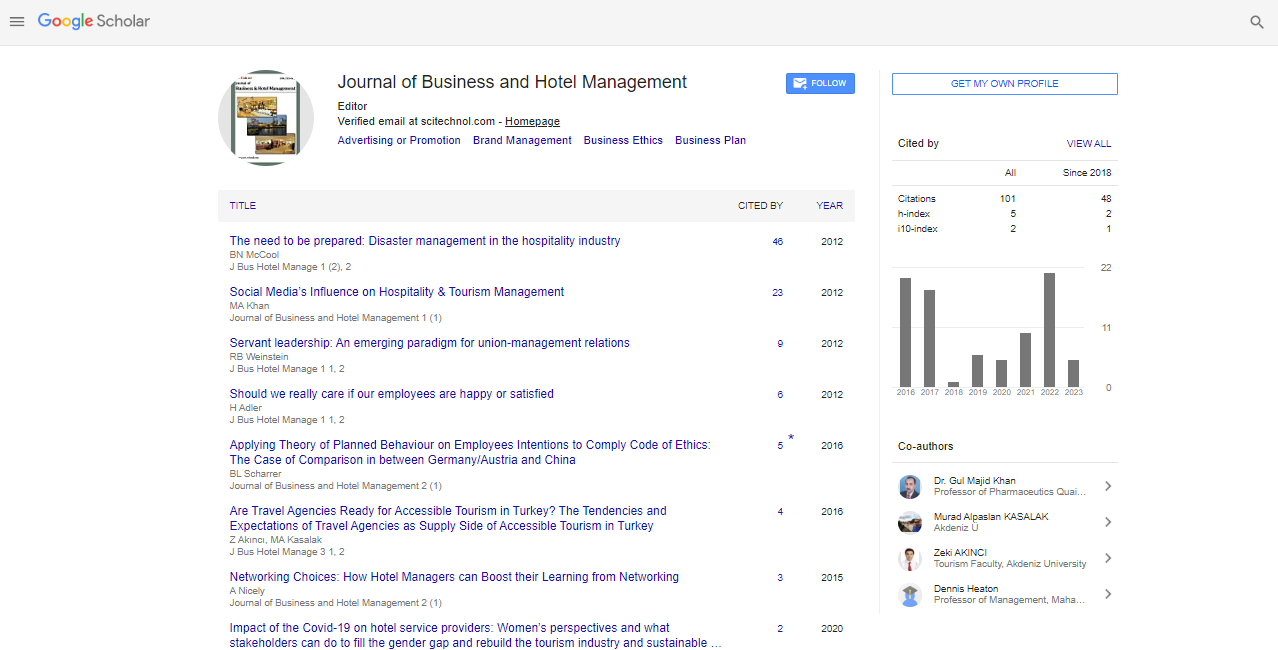Perspective, Jbhm Vol: 9 Issue: 3
Enhancing Guest Experiences: The Application of Six Sigma Management in Hotel Management
J Shaw Yang*
Department of Financial Economics, Oxford Brookes Business School, Oxford Brookes University, UK
*Corresponding Author: J Shaw Yang
Department of Financial Economics,
Oxford Brookes Business School, Oxford Brookes University, UK
E-mail: Yangshwa98@gmail.com
Received date: 28 August, 2023, Manuscript No. JBHM-23-117772;
Editor assigned date: 30 August, 2023, PreQC No. JBHM-23-117772 (PQ);
Reviewed date: 13 September, 2023, QC No. JBHM-23-117772;
Revised date: 21 September, 2023, Manuscript No. JBHM-23-117772 (R);
Published date: 29 September, 2023, DOI: 10.4172/2324-9129.1000147
Citation: Yang JS (2023) Enhancing Guest Experiences: The Application of Six Sigma Management in Hotel Management. JBHM 9:3.
Description
In the competitive landscape of the hospitality industry, providing exceptional guest experiences is paramount. To achieve this, many hotels are turning to Six sigma management techniques, originally developed in manufacturing, to improve processes, enhance efficiency, and ultimately, elevate customer satisfaction. This article explores the application of Six sigma in hotel management and how this methodology is reshaping the way hotels operate, ensuring seamless service, and creating memorable stays for their guests.
Understanding six sigma in hotel management
Six sigma is a data-driven methodology aimed at identifying and eliminating defects or variations in processes to achieve near-perfect results. In the context of hotel management, Six sigma focuses on streamlining operations, reducing errors, and enhancing the quality of service. By using statistical tools and analysis, hotels can identify areas of improvement, set benchmarks, and monitor progress, thereby ensuring that every aspect of their service meets or exceeds guest expectations.
Process optimization in hotel operations
One of the key principles of Six sigma is process optimization. Hotels have numerous processes, ranging from check-in and room service to housekeeping and guest feedback management. Six sigma methodologies allow hotel managers to analyze these processes in detail, identifying bottlenecks and inefficiencies. By streamlining these operations, hotels can reduce waiting times, improve response rates, and deliver services promptly, leading to higher guest satisfaction.
Data-driven decision making
Six sigma relies heavily on data analysis. Hotels gather vast amounts of data, including guest feedback, occupancy rates, and service response times. By employing Six sigma techniques, this data can be analyzed to identify patterns and trends. For instance, if a particular service-related issue arises frequently in guest feedback, Six sigma tools can pinpoint the root cause, enabling hotel management to make informed decisions to address the problem effectively.
Enhanced employee training and engagement
Incorporating Six sigma principles in hotel management involves training employees in the methodology. By imparting Six sigma training, hotels empower their staff to identify problems, suggest solutions, and actively participate in the process improvement initiatives. This not only enhances the problem-solving skills of the employees but also fosters a culture of continuous improvement and innovation within the hotel workforce.
Guest-centric approach
Six sigma methodologies emphasize a customer-focused approach, aligning perfectly with the hospitality industry's core philosophy. By applying Six sigma tools to guest feedback analysis, hotels can discern the specific needs and preferences of their clientele. This insight allows hotels to customize their services, ensuring that guests receive personalized experiences tailored to their expectations. Such attention to detail enhances guest satisfaction and fosters guest loyalty, leading to repeat business and positive word-of-mouth recommendations.
Cost reduction and improved profitability
Efficient processes, reduced errors, and optimized resource utilization, all outcomes of Six sigma implementation, lead to cost savings for hotels. By minimizing wastage and maximizing productivity, hotels can enhance their bottom line. Moreover, the improved guest satisfaction resulting from streamlined operations often translates into higher customer loyalty, positive reviews, and increased revenue through repeat business and referrals.
Conclusion
In the ever-evolving landscape of hotel management, the application of Six sigma principles has emerged as a game-changer. By embracing data-driven decision-making, process optimization, and a guest-centric approach, hotels can provide unparalleled service experiences. As Six sigma continues to shape the industry, hotels that invest in this methodology are not only ensuring the satisfaction of their guests but also securing a competitive advantage in the fiercely competitive hospitality market. Through the application of Six sigma management, hotels are not just managing rooms; they are managing seamless, memorable experiences, one guest at a time.
 Spanish
Spanish  Chinese
Chinese  Russian
Russian  German
German  French
French  Japanese
Japanese  Portuguese
Portuguese  Hindi
Hindi 